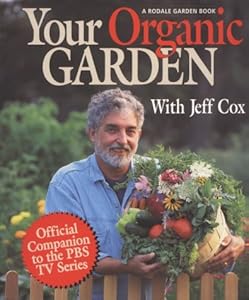 Cover via Amazon#1 Rotate crops. Different vegetables and fruits absorb different nutrients from the soil. If you plant tomatoes for example, in the same spot every year, eventually they’ll deplete the soil of the nutrients they need - and they'll also attract pests who think they've found a restaurant serving their favorite food year after year! However, if you rotate your garden, planting flowers where you plant veggies and veggies where you plant flowers, or different vegetable families in succession, or simply rotating where you plant your veggies then you’ll have healthier and tastier produce. Additionally rotation also helps prevent attack by disease and pests. (We'll post a longer article on crop rotation next week, so be sure check back to learn more.)
Cover via Amazon#1 Rotate crops. Different vegetables and fruits absorb different nutrients from the soil. If you plant tomatoes for example, in the same spot every year, eventually they’ll deplete the soil of the nutrients they need - and they'll also attract pests who think they've found a restaurant serving their favorite food year after year! However, if you rotate your garden, planting flowers where you plant veggies and veggies where you plant flowers, or different vegetable families in succession, or simply rotating where you plant your veggies then you’ll have healthier and tastier produce. Additionally rotation also helps prevent attack by disease and pests. (We'll post a longer article on crop rotation next week, so be sure check back to learn more.)#2 Use friendly insects as natural pesticides. Ladybugs are a great tool to eliminate aphids from your garden. You can buy wiggly bags of them at your local nursery or even order them online. Place them in your garden and prevent infestation.
#3 Organic insecticides can be used to prevent things like beetles and worms, when absolutely necessary. But don't overdo it - remember the principles of organic gardening are to keep everything in balance, which means not trying to kill off any particular species, but keeping things in harmony.
#4 Use specific plants to attract or repel insects. For example, Sage repels cabbage moths and black flea beetles and marigolds repel a variety of insects.
#5 If you’re sowing your own seeds, then you’ll want to sow them from organic fruits and vegetables. If you’re buying plants to start with, you’ll want to make sure they’re organic. Otherwise you are starting your plants off right away in an unhealthy and artificial environment.
 Organic vegetables (Photo credit: Wikipedia)#6 Plant vegetables in a rich soil. Compost is a wonderfully sustainable and nutrient rich way of providing everything your plants need to grow and survive.
Organic vegetables (Photo credit: Wikipedia)#6 Plant vegetables in a rich soil. Compost is a wonderfully sustainable and nutrient rich way of providing everything your plants need to grow and survive. #7 If you’re sowing seeds, sow several times more than you think you’ll need. For example if you’re only going to plant one tomato plant in your garden, sow 3 or 4 seeds. Seeds don’t always grow well and you can then choose the strongest looking to plant in your garden.
#8 Read the information on the back of the seed packet or the tag. This information will tell you how much sun and water the plant needs. This is all good information that will help you grow the healthiest plants.
#9 Label your plants. Use the tag attached to the plant when you bought it or make your own. Mid-season, it can be easy to forget what plant is what, and you'll also want to write down what is planted where, so that you can practice crop rotation properly.
#10 Prevent fungus and disease. The biggest killer of most vegetable gardens in damp areas is fungus and mold. Keep your plants pruned and keep the soil damp but not soaked. Additionally, you'll want to mulch most plants to keep soil from splashing up on the leaves when it rains, which can cause some fungal diseases. But make sure there isn’t too much of an accumulation of mulch right around the plant stems - mulch only up to about 3-4 inches away from the stems to avoid the mulch holding water too close to the plants, which can foster mold or other fungal growth.
Organic gardening is a fun and easy way to bring fresh produce into your home. You can grow flowers, herbs, vegetables and even fruits organically - knowing you're doing something good for both yourself and the planet!
Organic Gardening Resources:

No comments:
Post a Comment